- Home
- Tony Roberts
Casca 41: The Longbowman Page 4
Casca 41: The Longbowman Read online
Page 4
“Still don’t think Wakely will like it,” Will said.
“Well what is he going to do? By the time he finds out we’ll be over in France. He’s not with us here, thankfully.”
As they waited for the rest of the army to embark, they felt the ship’s anchor rise and the vessel begin to move. Now they were on their way out to sea.
CHAPTER FOUR
After a few days of milling about and thanking God for the fair weather, they had set off. The men tried to stave off boredom by going for walks on the deck and watching the spectacle of the hundreds of ships, some counted over a hundred and thirty of them. As they set off someone pointed out a load of swans swimming alongside, which everyone said was a good omen, but then another pointed across the bay and said that three of the ships had caught fire and were burning fiercely. Someone had been careless by the looks of things.
Casca wondered on that. He also noted they were sailing south east, past Portsmouth and out into the Channel, so the Bordeaux option definitely looked out of the question. Calais? That was still held by the English, and it would be sensible to land there in the safety of a friendly port and then march from there to burn, plunder and devastate, or take a town or two.
He thought it might possibly be Normandy; however if they did they would be landing in hostile territory and they would have to be fast in getting off and setting up a camp before the local French forces turned up to contest their invasion.
The others passed the time sharpening their weapons, checking their equipment or throwing up over the side. There were some who simply weren’t sailors, no matter how flat and benign the waters may be, and Casca, having traveled many times in his long life by sea, thought the channel on this particular voyage to be one of the calmest he’d seen it.
Liz found him gazing thoughtfully over the port rail, looking at the receding shore of England on the second day of the voyage. “Regrets?”
Casca stirred, looked at Liz and grinned. He resisted the impulse to wrap an arm round her. She was, after all, supposed to be a boy. She looked like a street urchin from Southampton. Lucky she didn’t have a generous chest. “Wondering when I’ll see the same coast again.”
Liz frowned and stood alongside him. “We’ll see it again soon, won’t we?” she glanced about to see if anyone was close enough to hear. On a ship this size it was hard not to be close to someone at all times. There was always work going on with the crew making sure the ship was in shape and sailing well. Ropes had to be stowed or coiled, the deck had to be kept free of clutter and cleaned, the rigging checked in case it was fraying. The poop deck, at the stern, was always manned by two and sometimes three people, and the f’c’sle at the prow had two men watching ahead. Another was up the single mast keeping lookout. She lowered her voice. “But where shall we go? I don’t want to return to Southampton. What about London?”
Casca looked out across the sea, through the mass of other ships to the faintly seen south coast. “Plenty of places in England to live. London is no different to Southampton, really, except it’s much bigger. I would like a quiet place away from it all.” He knew that by the end of the campaign his belly would be full from war and he’d once again want to be away to heal. It always went like that. It paid well, better than farming which was what he tended to do when not killing someone on behalf of someone else, but he needed it to get his head together after a war.
“Oh? You have somewhere in mind?”
“Not yet, but maybe we’ll find some place, maybe even over here.”
“France? But we’re at war with them!”
“We won’t be forever, and let’s not forget Calais or Aquitaine is English. There’s nothing to stop us settling down in either of those locations. Think about it, Liz.” Casca had been a farmer in Normandy some centuries back, before he’d joined the Norman army in William the Bastard’s time, and he’d found it a reasonably decent place to farm.
“I’d prefer England,” Liz said in a low voice, leaning forward as a deck hand passed by, carrying a bucket of water.
“Well, we can always think on that once this war is over. We’ve got to get through this first. I’ve got to give you some idea of what to expect, and what you’ll be expected to do. Might as well be now. I might not get another chance before we land.”
So he spoke to her about the harsh life in a camp and on the march, of the hostility of the local people and the gut-turning terror of being in battle. That was the one fear Casca had about Liz; being caught up in a fight. She was strictly a non-combatant, but her role as page or whatever would mean she would be close to whatever battle there may be.
Liz’s role would be to keep Casca and his close group supplied with arrows and drink. As Casca’s personal page she also had to make sure he had food, lodgings and his health looked after. The one problem in his mind was the reaction of the sergeant, Wakely. He was a well-known miser, according to the others, and would not look well on the fact they had an additional member of the group.
Will and Walt would be supportive, but the others weren’t that well known and Casca worried that Wakely might have an informant amongst them; people like that often did. It helped keep the group under better control if they were spied on. There were six others, all archers, all from the Welsh borders, either from Wales itself or from the English side. Neither side loved the other, and the closer they lived to the border the more they hated the other. Jibes about sheep molestation were frequently heard and it led to a few fisticuffs, usually these were sorted out by Wakely. With him not being aboard and being instead on the other ship that their group was sailing in, there was nobody to stop the nonsense. Naturally Casca was looked to, being the biggest and toughest there, so eventually, in the evening of the second day, he had to stop two of the most antagonistic from injuring one another. The Welshman, Andrew ap Morris, had a gut full of insults from an Englishman from Shrewsbury, John Sills. Sills really had no love for the Welsh and spent most of his energies letting everyone know how contemptible they were.
Ap Morris – everyone called him Andrew – took enough until his patience snapped. Now Andrew was squaring up to John in the cargo hold, threatening to brain him with a mallet. Sills was armed with his balloch knife and it looked for a moment as if the two would kill one another.
Casca stepped in between the two. “Alright, enough. I’m tired of hearing your shit, Sills. Cut it out.”
“You the sergeant?” the man from Shrewsbury snapped angrily, his blue eyes flashing beneath his overhanging brow and black, curly hair. “You aren’t so you don’t go telling me…”
He got no further as Casca took him by the throat and pinned him to the wall. He held the man’s knife wrist in his other hand. “No I’m not the sergeant, but I’m not going to take any of your messing. Watch yourself, Sills, or you’ll be needing a new set of teeth.”
Sills struggled but found himself held fast, like he was in the grip of iron. He’d never experienced such a grip before, and it worried him. His throat hurt and he nodded, trying to swallow. Casca released him and glared at the man before turning to Morris. The Welshman put his mallet down. “Bloody good,” he said with a smile, “needs someone yer to keep things in control. Bloody stupid if you ask me,” he continued, sitting down, “not having the sergeant yer to keep order.” Andrew spoke each syllable slowly and clearly.
“Aye,” Walt agreed from his hammock, whittling away on a piece of wood. “Wondered why he didn’t sail with us.”
“Who knows? Maybe he thought we were well behaved and could be trusted?” Casca shrugged.
“He was supposed to be with us,” Walt commented, frowning. “In fact your young lady here took his place. I haven’t thought about that before. Ten to a ship, so we’ve been told, and he was supposed to be the tenth, wasn’t he?”
The others grunted. It was a mystery why Wakely wasn’t there with them. Casca scratched his head. “Well, until we land I’m keeping order, so nobody tries anything. We’re in the same army so let’s g
et along, even if we hate each others’ guts.”
Sills glared at Casca and sat down heavily, massaging his throat and wrist. Andrew nodded and grabbed a post hastily as the ship lurched in the swell. “Hope we don’t hit a storm,” he said, “I don’t know if I’ll keep my breakfast down otherwise.”
“We should be alright,” Casca said and sat down, putting his arm round Liz. “If we were going down Bordeaux way we might get some nasty stuff; the Bay of Biscay is notorious, but not the channel here. I expect we’ll make landfall tomorrow or the day after.”
His words turned out to be true enough. Two days after setting sail they came into a wide river mouth and the anchors rattled down as the ships sought a clear space to stop for the night. The men – and Liz – eagerly lined the rail and looked out over a stony shore to one side of the river mouth. “Where do you think we are, Cass?” Liz asked in wonder.
Casca grinned, recognizing the place. He’d been this way with William the Bastard’s Norman army as it sailed in the opposite direction en route to conquer the Saxon kingdom of England. “This is the mouth of the Seine. Paris is along that river.”
“We’re going to Paris?” Will asked excitedly.
“By God,” Walt chuckled, “wouldn’t that be a sight? Paris, you think, Cass?”
Casca shrugged. “I would think the French would have an army in the way. We’re what – ten thousand? The Frenchies could raise double that in no time around Paris. We’d get cut off too if we marched inland without a supply point.” He glanced to the north. A port could be seen in the distance. “Wouldn’t be surprised if we went for that,” he nodded.
“What is that place?” Andrew asked, gripping the rail tightly; he was pleased to not have thrown up so far, and was desperately hoping they could get off onto firm land. God never intended His people to travel across water, else He would have given them fins, he was certain of it. It was divine punishment for daring to go where God hadn’t intended him to.
“Don’t know,” Casca admitted. It was a town that had sprung up in the three and a half centuries since he’d been this way last. During the Crecy campaign the army had passed by some miles inland from this point. “No doubt we’ll find out soon enough.”
They remained aboard for the night but the following day they were told to get into small boats, reached by climbing down ropes from the deck, and were ferried to the rocky shore where men were milling about. It was a mass of confusion, and they were assured that their equipment would follow over the next few days. The king for now wished them to get ashore just in case the French turned up in force.
The shore was full of boulders and rocks, but beyond it where once was probably marshland, there were now ditches that had been dug, and these were full of water. The marshes had as a result been drained. Beyond them were earthworks, probably made up of the material dug up to create the ditches, and these acted as a sea defense. Beyond these the land rose in a series of grassy rises, fenced or separated by stands of trees. This was farmland.
A priory stood on one of the hills and the king’s banner could be seen fluttering from it, the sunlight reflecting off the many breastplates of the soldiers there with him. Other flags hung from poles or stands, and they sought out and finally located that of Sir Godfrey Fulk, hanging from a hastily erected tent on one of the lower slopes of the first hill.
“Now, Liz, best stick close to my side,” Casca advised the woman. “From now on you’d best be called something more appropriate to that of a boy. Any choices?”
“Pip,” she said without hesitation.
Casca looked sharply at her as they pushed through a milling throng, Walt and Will close behind. “Why Pip?”
Liz looked at him for a moment. “I used to have a younger brother,” she said, then said nothing more.
Casca nodded. So be it. “Pip it shall be. Hear that, lads?”
“Aye. Pip.” Walt grinned. “Suits you, Pip.”
Liz – or Pip – smiled. It would be fitting for her to be called that of the sibling she lost so long ago. It kept his memory alive.
They arrived and stood in a group, uncertain of what to do next. A captain came up to them and they were soon identified. “Where’s your sergeant? Wakely?”
“Dunno, sire. He was with another ship, wasn’t he?” Casca said.
“No. Damned man; seems he never made the crossing. Wasn’t in any of the ships, anyway.”
Casca glanced at the others. Wakely had the wages with him. He turned to the captain. “Then what happens now, sire? He had the archer’s remunerations on him.”
The captain pulled a face. “I know, curse it! I shall have to have a word with Sir Godfrey. Don’t worry yourselves on that matter, boys. Get yourself into a group; we’re going to pitch tents here. They’ll be arriving this afternoon. Got your food with you?”
“Ah, Captain, we had enough for a few days.”
“Oh, that won’t do! Didn’t Wakely tell you to pack for three months?”
The others all shook their heads. Casca groaned. Typical fuck up. “No, sire. We got no such order.”
The Captain sighed deeply. “So I’m beginning to learn. I hope the man’s soul rots in hell! Seems he’s run with the wages. Very well, we’ll take care of that, don’t you worry. I’ll see what can be done to feed you.” With that he moved off to the next group to find out what shortages they had.
They soon merged with the other archer groups and they exchanged tales of the crossing and of their dilemma. The tents were thrown in a huge pile by the suppliers at the edge of the beach and the men were organized into carrying them up to the higher slopes of the hillsides. Men were everywhere, but as yet the horses and the bigger pieces of equipment had to be offloaded.
That evening they sat round in groups in front of their tents. Pip, as everyone now called ‘him’, was sat next to Casca. Walt and Will were on either side of the two, and Andrew and Sills opposite. Sills had quietened down since Casca had threatened him. “The town nearby is called Harfleur, so I hear,” Casca said, waving a hunk of bread in the air. “Seems the king is going to attack it. He wants it as his supply depot. We’re going to have to surround it.”
“Is it garrisoned?” one of the others asked, a Welshman by the name of Gavin.
“You bet it is. I’ve no news as to how many, but it’ll be a siege and we all love those, don’t we?”
The others muttered and made disparaging comments. “Any news on the French armies?” another of the group asked.
“Not yet, but you can bet your life they’ll know by now we’re here.” Casca took a pull of watered beer from his bottle. The English never drank pure water; it was too polluted to do that, so they made beer from it to make a safe drink – the alcohol killed whatever bugs were in the water. Even the children drank weak beer. “Anyone know for sure that the French king is crazy? I hear stories.”
“They’re all crazy, aren’t they?” Walt said, a wicked smile breaking out.
“Perhaps, yes,” Casca conceded, “but this one is particularly mad; someone told me he thinks he’s made of glass or something like that.”
They all chuckled at that. Casca was pleased about that; if the French king was mad, it helped make the French command muddled. With no strong leader to keep the different feudal princes in line, the enemy hierarchy was likely to be divided which would only help make them confused.
Later that evening Casca was lying in his tent, staring up at the white cloth, thinking. He often did that, for he didn’t care much for the frequent nightmares about the dead he’d slain returning to haunt him. Gladiators, Germans, Persians, Olmecs, Hsiung-Nu, Huns, Romans, Goths, Arabs….the list went on and on. So he often thought about his life, and how it would end. The Jew, Jesus, said when He returned again He would meet Casca. But then what? Would He exact further punishment on the scar-faced Roman for spearing Him on the cross, or would the Jew take pity and forgive him? His religion preached forgiveness, yet Casca had experienced none of that. To be tortured with h
is immortality daily was sometimes too much, yet any attempt to take his own life always ended in failure. Therefore he just had to continue on and on, fighting, fighting, fighting.
The question of when was always in his head. Would he get a sign, some kind of notice that it was coming, or would he be taken by surprise, and get a tap on the shoulder from the bearded man? Would the Jew find him no matter where he was, or would it be in Jerusalem where it had all begun?
He sighed. He had no idea. Best just carry on and do what he did best. Kill whoever opposed him in war. He glanced at the girl lying snuggled into his side, and slipped one arm round her. She sighed softly in her sleep and pressed closer to him. Casca smiled despite himself. There had to be some benefits to living all this time. A willing woman was one.
He just hoped she’d survive the campaign.
CHAPTER FIVE
The day dawned warm and bright. They were shouted at to form up into their units. Because they had no sergeant their group hung about uncertainly until the captain confronted them. “I’m going to appoint a sergeant to replace Wakely.” He looked at Casca. “You’re the biggest, meanest looking one here, and you’ve fought before, Long, am I right?”
“Sire,” Casca bowed once.
“Therefore it makes sense to make you the leader of this rabble. You take orders from me and pass them down to these peasants. If any gives you trouble you have my permission to enforce whatever discipline you see fit, but get them to damn well comply!”
“I’m fine with that,” Casca said, eyeing the apprehensive looking archers. “What about their pay? And food?”
“Ah, well I’m glad you asked that. The pay will be sorted out tomorrow once we surround the town. For now, I want you to lead your men on a foraging mission to the local farms. Seize as much livestock as you can. We need food, so get it.”
“And the locals?”

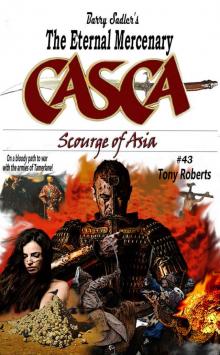 Casca 43: Scourge of Asia
Casca 43: Scourge of Asia The Lombard
The Lombard Casca 49: The Lombard
Casca 49: The Lombard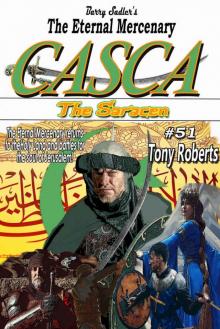 The Saracen
The Saracen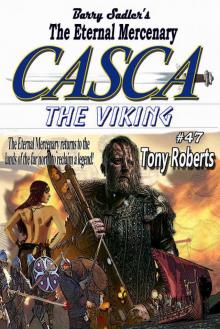 Casca 47: The Viking
Casca 47: The Viking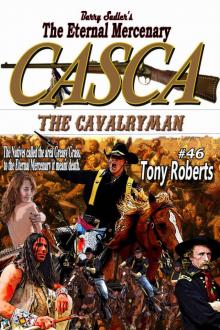 Casca 46: The Cavalryman
Casca 46: The Cavalryman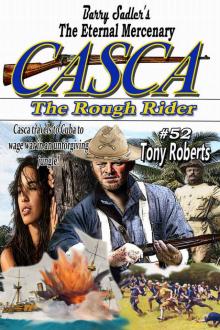 Casca 52- the Rough Rider
Casca 52- the Rough Rider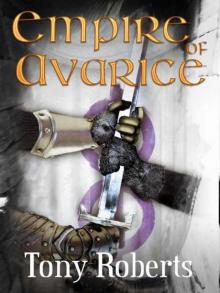 Empire of Avarice
Empire of Avarice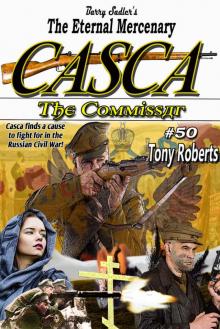 The Commissar
The Commissar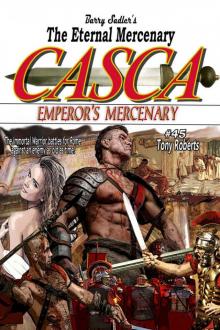 Casca 45: Emperor's Mercenary
Casca 45: Emperor's Mercenary Dark Blade
Dark Blade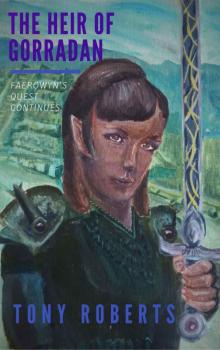 The Heir of Gorradan (Chronicles of Faerowyn Book 2)
The Heir of Gorradan (Chronicles of Faerowyn Book 2)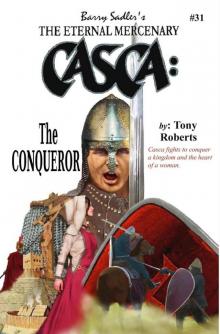 Casca 31: The Conqueror
Casca 31: The Conqueror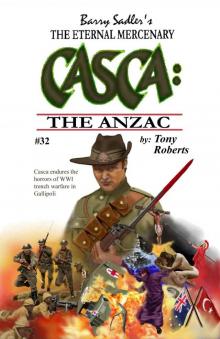 Casca 32: The Anzac
Casca 32: The Anzac The Anzac
The Anzac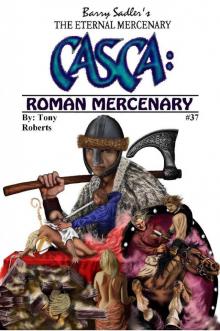 Casca 37: Roman Mercenary
Casca 37: Roman Mercenary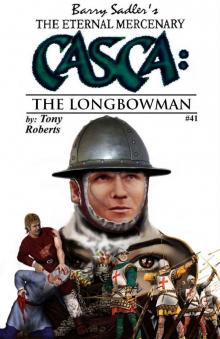 Casca 41: The Longbowman
Casca 41: The Longbowman The Longbowman
The Longbowman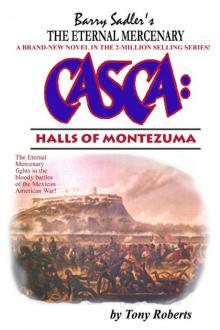 Casca 25: Halls of Montezuma
Casca 25: Halls of Montezuma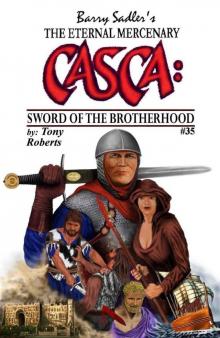 Sword of the Brotherhood
Sword of the Brotherhood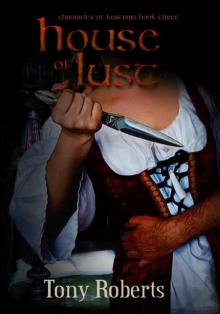 House of Lust
House of Lust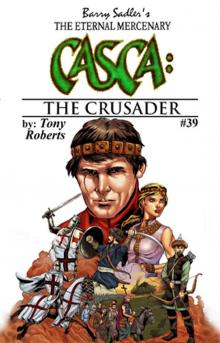 Casca 39 The Crusader
Casca 39 The Crusader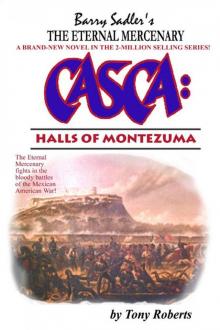 Halls of Montezuma
Halls of Montezuma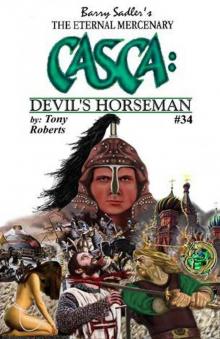 Devil's Horseman
Devil's Horseman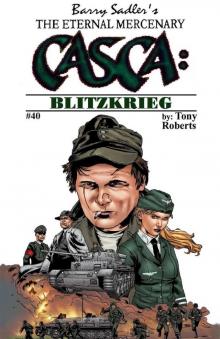 Casca 40: Blitzkrieg
Casca 40: Blitzkrieg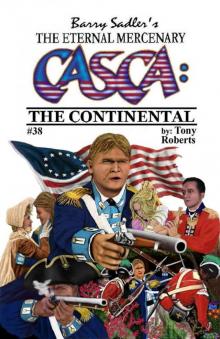 Casca 38: The Continental
Casca 38: The Continental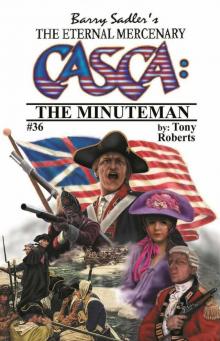 The Minuteman
The Minuteman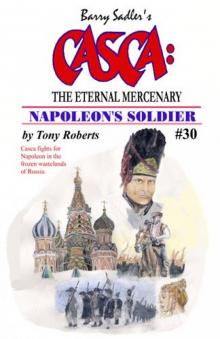 Napoleon's Soldier
Napoleon's Soldier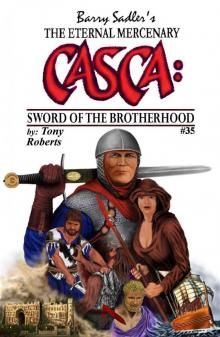 Casca 35: Sword of the Brotherhood
Casca 35: Sword of the Brotherhood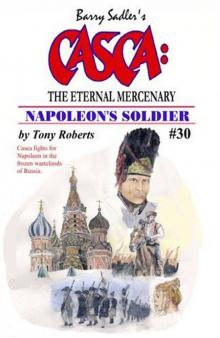 Casca 30: Napoleon's Soldier
Casca 30: Napoleon's Soldier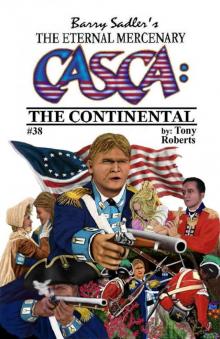 The Continental
The Continental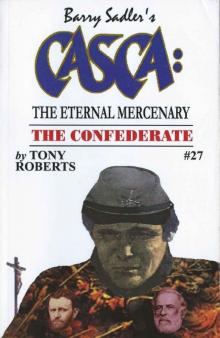 The Confederate
The Confederate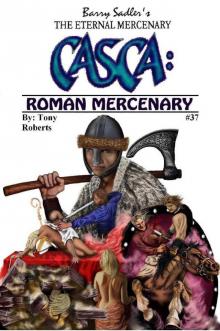 Roman Mercenary
Roman Mercenary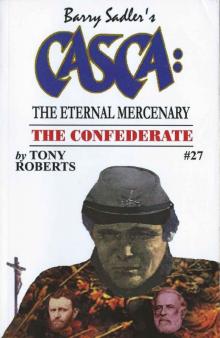 Casca 27: The Confederate
Casca 27: The Confederate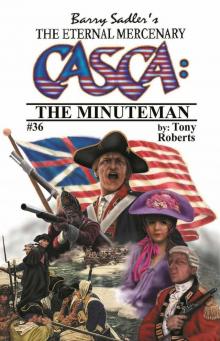 Casca 36: The Minuteman
Casca 36: The Minuteman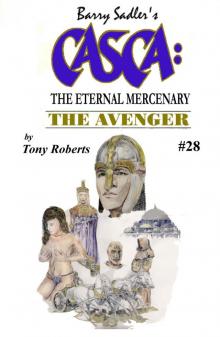 Casca 28: The Avenger
Casca 28: The Avenger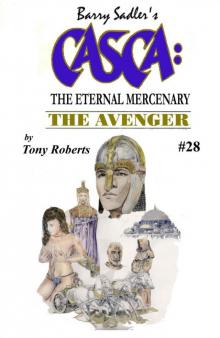 The Avenger
The Avenger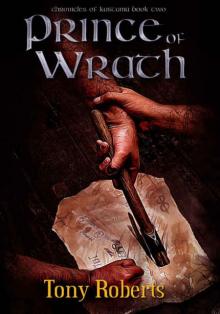 Prince of Wrath
Prince of Wrath